16 Oct 21 | Legal action against journalists, Malta, Media Freedom, News and features, Slapps
[vc_row][vc_column][vc_single_image image=”117699″ img_size=”full” add_caption=”yes” alignment=”center”][vc_column_text]The following remarks were made by Caoilfhionn Gallagher, QC of Doughty Street Chambers, a member of the international legal team for the family of Daphne Caruana Galizia at a vigil on Friday 15 October 2021 at the Maltese High Commission to mark the fourth anniversary of Daphne’s assassination.
“We gather today in London to pay tribute to Daphne Caruana Galizia and honour her memory, and to stand in solidarity with her bereaved family in Malta. On this, the fourth anniversary of her assassination, I wish to say four things.
“First, it is now ten weeks since the independent public inquiry in Malta published its detailed 437-page report, finding that the Maltese State should shoulder responsibility for her death. The damning report concluded that a culture of impunity was created from the highest echelons of power within the Castille. Former Prime Minister Joseph Muscat was singled out and identified as enabling this culture of impunity, and his entire cabinet was found to be collectively responsible for their inaction in the lead up to the assassination.
“The State, the report held, ‘created an atmosphere of impunity, generated from the highest echelons of the administration inside Castille, the tentacles of which then spread to other institutions, such as the police and regulatory authorities, leading to a collapse in the rule of law.’ The report laid bare endemic corruption and fundamental structural failures, the very subjects of Daphne’s reporting.
“The Government created a ‘favourable climate’ for anyone seeking to eliminate Daphne to do so with the minimum of consequences, giving a green light to her being treated as a target. The State also failed to recognise the real and immediate risks to Daphne’s life, and failed to take reasonable steps to avoid those risks. And a myriad of other systemic failings were identified which failed Daphne, failed her family, failed journalists, and failed the Maltese people.
“And yet, 10 weeks on, we remain without a meaningful response to that report by the Maltese Government. The Government has not even released an English translation of the 437-page report – what translations you have heard or read have been provided by the bereaved family and their lawyers, not the State. Even this basic step, to commit to transparency and enable the international community to understand what happened and hold Malta to account, has not been taken.
“Second, it is now four years since Daphne was brutally murdered, in an assassination which sent shockwaves across Europe. Daphne was a brilliant, brave, dogged investigative journalist, who honed her craft over decades, often sitting at her kitchen table where she spent her last few hours with her son Matthew.
“She was isolated in those final months and years, facing multiple oppressive law suits, threats of financial ruin, abuse on the street and online, dehumanising and misogynistic images circulating. And yet, there has still been no unequivocal acceptance of the horrors that she faced, let alone an unequivocal apology for it, from Malta.
“Third, I ask what should Malta now do? Daphne’s assassination followed decades of abuse. It occurred within a climate of impunity and negative rhetoric directed against Daphne and other journalists in Malta. Today, her family calls upon the Government of Malta to unequivocally condemn the climate of impunity and negative rhetoric identified by the public inquiry, which dehumanised her and fuelled her murder.
“There must be root and branch political and legislative reform.
“And above all, Daphne’s family must have meaningful involvement in what comes next. The family counts on the Prime Minister to consult with them and civil society on the foundational principles for the independent committee of experts due to be appointed following the inquiry report, and on Terms of Reference to implement those principles. This consultation process is an essential first step before the proposed roles of committee members are formulated.
“Fourth, I ask what should the international community now do? It is fitting that we are standing here in central London. Many of those threatening legal letters which bombarded Daphne in the final months and years of her life came from London law firms. Whilst that climate of impunity festered in Malta, the world stood idly by. The UK and other countries across Europe ignored what was happening under their noses, and left Daphne to her fate.
“On 6 October 2017, weeks before her death, Daphne wrote on her blog, ‘in journalism, as in many areas in life, you sometimes find the back-up you need a little too late.’ Well, one week ago the Nobel Peace Prize was awarded to two investigative journalists, one of whom, Maria Ressa, I am honoured to represent. The Norwegian Nobel Committee recognised their efforts to safeguard freedom of expression, ‘a precondition for democracy and lasting peace.’
“The awarding of the Nobel Peace Prize to journalists is a welcome recognition of the bravery of journalists doing what Daphne Caruana Galizia did so brilliantly – holding the powerful and the corrupt to account. This is important back-up from the international community, albeit far too late for Daphne. In the decades leading up to her assassination, the world failed to act. They failed to act in 2017. Four years on, it is long past time for other States who clam to believe in the importance of freedom of expression – the UK, Council of Europe Member States, EU Member States, every single country which has signed up to the Media Freedom Coalition – to act. They failed Daphne then. Now, they must hold Malta to account and ensure the change Daphne’s family and Malta need and deserve comes to pass.”
The vigil for Daphne was co-sponsored by the Maltese community in London, ARTICLE 19, the Association of European Journalists, the Commonwealth Journalists Association, Index on Censorship, PEN International, Reporters Without Borders, and Transparency International-UK.
[/vc_column_text][/vc_column][/vc_row]
11 Oct 21 | Opinion, Ruth's blog
[vc_row][vc_column][vc_single_image image=”117686″ img_size=”full” add_caption=”yes”][vc_column_text]As you may have seen from our social media feeds and our website, Index on Censorship is working to ensure MPs and the public are aware of the unintended consequences that may arise from the UK Government’s planned Online Safety Bill.
The Bill is based on the ‘duty of care’ concept, which underpins health and safety law in the workplace. However, there is a huge difference between protecting workers from workplace injury and protecting citizens from harm on the internet at the same times as protecting our fundamental freedom of expression rights.
The Bill has introduced the concept of ‘legal but harmful’ and would give social media platforms the power to remove content that could be considered ‘harmful’ to some people. But who makes that decision? Governments, private companies, an algorithm? Who decides when an idea is harmful but remains legal? Where would we be if the suffragettes had been considered harmful? Where would we be if Pride marches had been considered harmful? Where would we be if the civil rights movement had been considered harmful? This is a fundamentally flawed concept.
We already have laws against child abuse, against hate speech, and against death threats – what we need is not more legislation, but more training and resources for the police and relevant organisations to tackle these crimes. The risk with the Online Safety Bill is that not only are these resources not given to tackle issue of child abuse, but that more freedoms and rights are taken away from people and our democracy threatened.
The EU are now developing their own online legislation along the lines of the Online Safety Bill with their Digital Services Act. Across the world, the dominance of social media is generating real issues for regulation and, particularly, in considerations of who is responsible for what is posted online and what is liable to be taken down. Determining the answers to both of these questions is not a simple process with no simple answer but considerable pitfalls for democratic rights. Failing to answer these questions in hurried legislation is a poor substitute for a considered response to what are legitimate concerns.
Over the next few months, Index will be working with European organisations to raise awareness of the ‘unintended consequences’ of the Digital Services Act that will hopefully also help to inform the debate here in the UK. The internet is worldwide, borders are irrelevant, and we have to ensure that vulnerable and marginalised voices are not erased from our societies. The internet is our new Wild West, but we must be careful of knee-jerk reactions that aim to do some good but end up restricting the freedoms we all value.
We have launched the #OffOn campaign to tell MEPs not to switch off our freedoms online and instead to protect fundamental freedoms of expression while strengthening the rule of law relating to criminal offences.
The aims of this campaign are to:
- Preserve what works and fix what is broken
The internet is still a formidable network that connects and empowers people. Preserving and enhancing fundamental rights must be the cornerstone upon which any legislation is built.
- Limit online regulation to addressing illegal content
Ensure that the process of judicial review is at the core of any adjudication mechanism.
- Support user empowerment and wider participation
Legislation should focus on putting users first by allowing them to have more control over the content they see, the ability to remain anonymous online, the right to end-to-end encryption and the right to be faced with proportionate and fair content moderation practices.
- Ensure due process and legal certainty
The rules applying to the online environment should offer the same due process safeguards as those that apply offline. Arbitration about the legality of content, or its use, often entails long and careful assessments by courts offline, while unrealistic turnaround times are imposed online for the same type of decisions. We must protect the careful balance of the rights at stake, as well as create an environment of legal certainty.
- Promote these principles in international discussions
The principles and objectives we endorse should not apply only to Europeans – they should be at the centre of the EU’s contributions in any discussions in multilateral and bilateral fora it participates in.[/vc_column_text][/vc_column][/vc_row]
08 Oct 21 | Kazakhstan, Legal action against journalists, Media Freedom, News and features, Slapps, United Kingdom
[vc_row][vc_column][vc_column_text]
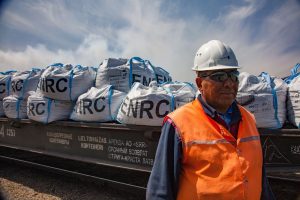
Metal Alloy plant. Worker in orange jacket and white hardhat on train with Eurasian Resources Group (ENRC). Alexey Rezvykh / Alamy Stock Photo
The undersigned organisations express their serious concern at the legal proceedings that have been filed in a UK court against journalist and author Tom Burgis, his publisher HarperCollins, and his employer the Financial Times (FT). Two lawsuits have been filed by Kazakh multinational mining company, Eurasian Natural Resources Corporation (ENRC), for what it claims are a series of “untrue” and “highly damaging” allegations made by the defendants about the company.
The first lawsuit, against Burgis and HarperCollins, centres around multiple passages in Burgis’ 2020 book Kleptopia: How Dirty Money is Conquering the World. The second lawsuit, against Burgis and the FT, relates to two FT articles by Burgis, eleven Twitter posts by Burgis based on the articles, and an FT podcast in which Burgis was interviewed about his investigation.
“We are extremely concerned that the lawsuits against Tom Burgis, HarperCollins, and the FT are Strategic Lawsuits against Public Participation (SLAPPs). SLAPPs are a form of legal harassment used by those with deep pockets to silence journalists and other public watchdogs by exploiting intimidatingly long and expensive legal procedures,” the undersigned organisations said.
The lawsuits filed in London follow earlier legal suits by ENRC in US courts against HarperCollins seeking disclosure of wide-ranging information relating to the publication of Burgis’ book and newspaper articles published in the FT. In the London lawsuits, ENRC claims that the publications defamed the company, including by falsely suggesting that it was involved in the deaths of two whistleblowers (former ENRC employees), whose bodies were found at a motel in Missouri in 2015.
A criminal investigation by the UK’s Serious Fraud Office into alleged corruption within ENRC opened in 2013 and is ongoing. It is understood to be focused on allegations of fraud, bribery and corruption around the acquisition of substantial mineral assets in the Democratic Republic of Congo and elsewhere. No charges have yet been brought. ENRC denies all allegations.
Since the SFO announced its investigation, ENRC has initiated a wave of more than 18 legal proceedings in the US and the UK against journalists, lawyers, investigators, contractors, and a former SFO official and the SFO itself. In June 2021, twenty-two organisations issued a statement condemning the ENRC’s lawsuits against public watchdogs.
“The lawsuits against Burgis, HarperCollins, and the FT are the latest in a deluge of litigation brought by ENRC as it attempts to robustly challenge corruption allegations,” the organisations said. “We are extremely concerned that ENRC’s legal tactics are a further attempt to silence those who interrogate any possible links between the company and incidents that warrant proper public scrutiny.”
“We urge the UK government to consider measures, including legal measures, that would protect journalists and other public watchdogs from abusive legal actions that are aimed at silencing them,” the organisations concluded. “Our democracy relies on their ability to hold power to account.”
The legal proceedings against Burgis, HarperCollins, and the FT were filed at the High Court of Justice of England and Wales on 27 August. The first hearing has yet to be scheduled.
Note to editors: ENRC was listed on the London Stock Exchange until 2013, when it became embroiled in controversy over governance issues and went private. Today it is owned by Eurasian Resources Group registered in Luxembourg. The ‘Trio’ who own the majority shares in ENRC (now ERG) are Alexander Machkevitch, Patokh Chodiev and Alijan Ibragimov. Mr Ibragimov died in February 2021. The Kazakh state owns an estimated 40 percent of the company.
SIGNED:
ARTICLE 19
Blueprint for Free Speech
Campaign for Freedom of Information in Scotland (CFoIS)
English PEN
IFEX
Index on Censorship
Justice for Journalists Foundation
Organized Crime and Corruption Reporting Project (OCCRP)
Osservatorio Balcani Caucaso Transeuropa (OBCT)
PEN International
Reporters Without Borders (RSF)
Rights and Accountability in Development (RAID)
Spotlight on Corruption
The Daphne Caruana Galizia Foundation
The European Centre for Press and Media Freedom
[/vc_column_text][/vc_column][/vc_row]
01 Oct 21 | Opinion, Ruth's blog
[vc_row][vc_column][vc_column_text]

Book burning, photo: Fred Kearney
It seems surreal that in the 21st century in Europe and in the US, we still have to make the argument for a free press and public access to literature. But since 1982 an international coalition against censorship has had to make exactly that case.
I find the concept of banned books chilling. Why would you seek to ban or destroy literature, culture and history? Why would you seek to remove arguments you disagree with rather than challenge them and prove that you are right? Banning books is a weak act – done by those who know that their arguments are easily defeated. But is this level of control and repression which scares me – we know where it can lead.
Of all the touching and heart-breaking Holocaust memorials in Berlin, it is the Empty Library that made me stop – a visual representation of what book burning is and what happens when intolerance is allowed to dominate. On 10 May 1933 20,000 books were burned – their authors were Jews, Communists and Socialists – 40,000 people crowded the Bebelplatz to watch them burn.
This is where banning books can lead. This is the ultimate reality of censorship and intolerance.
Occasionally I am asked why free speech is so important to me. Why is this even important anymore in the age of the internet and nearly unfettered access to the accumulated knowledge of the world for those of us lucky enough to live in liberal democracies. But this is why I fight for free expression, for tolerance, for knowledge, for debate. This is why I work at Index on Censorship. I don’t have to agree with an author to defend their right to publish. I don’t have to like a book to defend its right to be in a library and I don’t have to delete works that I fundamentally oppose.
Which brings us to Banned Book Week. Every year, in fact nearly every day, there are reports of libraries removing books or authors being challenged – not necessarily for their published works but on occasion for their views. The American Library Association publishes an annual list of the most challenged books in the US:
- George by Alex Gino. Challenged, banned, and restricted for LGBTQIA+ content, conflicting with a religious viewpoint, and not reflecting “the values of our community”.
- Stamped: Racism, Antiracism, and You by Ibram X. Kendi and Jason Reynolds. Banned and challenged because of the author’s public statements and because of claims that the book contains “selective storytelling incidents” and does not encompass racism against all people.
- All American Boys by Jason Reynolds and Brendan Kiely. Banned and challenged for profanity, drug use, and alcoholism and because it was thought to promote antipolice views, contain divisive topics, and be “too much of a sensitive matter right now”.
- Speak by Laurie Halse Anderson. Banned, challenged, and restricted because it was thought to contain a political viewpoint, it was claimed to be biased against male students, and it included rape and profanity.
- The Absolutely True Diary of a Part-Time Indian by Sherman Alexie. Banned and challenged for profanity, sexual references, and allegations of sexual misconduct on the part of the author.
- Something Happened in Our Town: A Child’s Story about Racial Injustice by Marianne Celano, Marietta Collins, and Ann Hazzard, illustrated by Jennifer Zivoin. Challenged for “divisive language” and because it was thought to promote antipolice views.
- To Kill a Mockingbird by Harper Lee. Banned and challenged for racial slurs and their negative effect on students, featuring a “white saviour” character, and its perception of the Black experience.
- Of Mice and Men by John Steinbeck. Banned and challenged for racial slurs and racist stereotypes and their negative effect on students.
- The Bluest Eye by Toni Morrison. Banned and challenged because it was considered sexually explicit and depicts child sexual abuse.
- The Hate U Give by Angie Thomas. Challenged for profanity, and because it was thought to promote an antipolice message.
These are not the only banned works we know of but it gives us all a flavour of the debate that is occurring across our liberal democracies and makes it clear of the work we still have to do. Of course, it isn’t just literature that is challenged or banned – but poetry and arts continue to be censored. Which is why, in partnership with the British Library. we held an event to mark Banned Books Week exploring poetry and protest – with Dr Choman Hardi and ko ko thett, chaired by Index on Censorship’s vice chair Kate Maltby. You can watch the event on catch-up here.
So, as we collective mark Banned Books week – I urge you – go into a bookshop or a library and get a book that challenges you, that inspires you and one that others seek to ban![/vc_column_text][/vc_column][/vc_row][vc_row][vc_column][three_column_post title=”You may also want to read” category_id=”41669″][/vc_column][/vc_row]
30 Sep 21 | Events
[vc_row][vc_column width=”1/2″][vc_single_image image=”117589″ img_size=”full”][/vc_column][vc_column width=”1/2″][vc_column_text]In preparation for COP26, Index on Censorship invites you to reflect on the role of indigenous activists in climate activism.
As we prepare for challenging and necessary conversations at COP26, Index on Censorship brings attention to the cases of people whose voices are too easily forgotten in climate change debates. Index sheds light on the challenges of speaking up about climate change.
Join us for the launch of the new Index on Censorship magazine, A Climate of Fear. The conversation will be chaired by Index on Censorship acting editor Martin Bright with a focus on indigenous activists in Ecuador fighting for environmental justice and those who tell their stories.
Steven Donziger is a US lawyer who was part of an international legal team that obtained a multi-billion-dollar pollution judgment designed to remedy decades of deliberate toxic dumping by global oil company Chevron on indigenous ancestral lands in Ecuador.
Jimmy Piaguaje is an indigenous defender and filmmaker of Siekopai nationality from the community of Siekoya Remolino in Ecuador’s northeastern Amazon region. He is the co-founder of the Sëra Foundation, a grassroots organisation created by a group of young people from Siekoya Remolino to preserve their ancestral knowledge via audiovisual techniques and education. His latest documentary, about fighting covid in the Amazon with ancestral medicine, was published by the New Yorker.
Bethany Pitts is a writer and activist who has been working with indigenous communities in Ecuador since 2013, especially those defending the Amazon from oil exploitation. She is the author of the Moon Guide to Ecuador & The Galapagos Islands, the first internationally published guidebook on Ecuador with a focus on ethical travel. It was while Bethany was in the Amazon researching for her book in 2018 that she met Jimmy Piaguaje. Since then, she has been working to support the Sëra Foundation.
Martin Bright has over 30 years of experience as a journalist, working for the Observer, the Guardian and the New Statesman among others. He has worked on several high-profile freedom of expression cases often involving government secrecy. He broke the story of Iraq War whistleblower Katharine Gun, which was made into the movie Official Secrets (2019) starring Keira Knightley. He is the founder of Creative Society, a youth employment charity set up in response to the economic crash of 2008.[/vc_column_text][/vc_column][/vc_row][vc_row][vc_column][vc_column_text]
When: Tuesday 19 October 2021, 17:30 to 18:30 BST
Where: ONLINE
[/vc_column_text][/vc_column][/vc_row]
29 Sep 21 | Magazine, Volume 50.03 Autumn 2021
Journalist
John Sweeney is a writer and journalist who has investigated Scientology and Russian interference in the US elections. He is the host of the Hunting Ghislaine podcast.
Activist and producer
Kelly Duda is an activist and producer and director of the documentary Factor 8: The Arkansas Prison Blood Scandal.
29 Sep 21 | Afghanistan, Americas, Artistic Freedom Commentary and Reports, Asia and Pacific, Australia, Burma, Cuba, Ecuador, Europe and Central Asia, Israel, Lukashenko letters, Middle East and North Africa, Religion and Culture, Russia, Syria, Turkey, Uganda, United Kingdom, United States, Volume 50.03 Autumn 2021, Volume 50.03 Autumn 2021 Extras
[vc_row][vc_column][vc_column_text]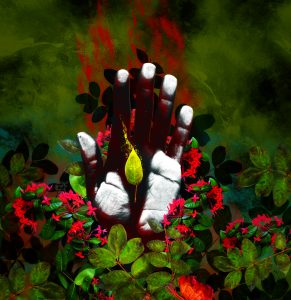
The Autumn issue of Index magazine focuses on the struggle for environmental justice by indigenous campaigners. Anticipating the United Nations Climate Change Conference (COP26), in Glasgow, in November, we’ve chosen to give voice to people who are constantly ignored in these discussions.
Writer Emily Brown talks to Yvonne Weldon, the first aboriginal mayoral candidate for Sydney, who is determined to fight for a green economy. Kaya Genç investigates the conspiracy theories and threats concerning green campaigners in Turkey, while Issa Sikiti da Silva reveals the openly hostile conditions that environmental activists have been through in Uganda.
Going to South America, Beth Pitts interviews two indigenous activists in Ecuador on declining populations and which methods they’ve been adopting to save their culture against the global giants extracting their resources.[/vc_column_text][/vc_column][/vc_row][vc_row][vc_column][vc_custom_heading text=”Up front” font_container=”tag:h2|font_size:22|text_align:left”][/vc_column][/vc_row][vc_row][vc_column][vc_column_text]
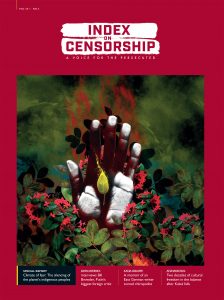
Cover of Index on Censorship Autumn 2021 (50-3)
A climate of fear, by Martin Bright: Climate change is an era-defining issue. We must be able to speak out about it.
The Index: Free expression around the world today: the inspiring voices, the people who have been imprisoned and the trends, legislation and technology which are causing concern.
Pile-ons and censorship, by Maya Forstater: Maya Forstater was at the heart of an employment tribunal with significant ramifications. Read her response the Index’s last issue which discussed her case.
[/vc_column_text][/vc_column][/vc_row][vc_row][vc_column][vc_custom_heading text=”Features” font_container=”tag:h2|font_size:22|text_align:left”][/vc_column][/vc_row][vc_row][vc_column][vc_column_text]The West is frightened of confronting the bully, by John Sweeney: Meet Bill Browder. The political activist and financier most hated by Putin and the Kremlin.
An impossible choice, by Ruchi Kumar: The rapid advance of Taliban forces in Afghanistan has left little to no hope for journalists.
Words under fire, by Rachael Jolley: When oppressive regimes target free speech, libraries are usually top of their lists.
Letters from Lukashenka’s prisoners, by Maria Kalesnikava, Volha Takarchuk, Aliaksandr Vasilevich and Maxim Znak: Standing up to Europe’s last dictator lands you in jail. Read the heartbreaking testimony of the detained activists.
Bad blood, by Kelly Duda: How did an Arkansas blood scandal have reverberations around the world?
Welcome to hell, by Benjamin Lynch: Yangon’s Insein prison is where Myanmar’s dissidents are locked up. One photojournalist tells us of his time there.
Cartoon, by Ben Jennings: Are balanced debates really balanced? Ask Satan.[/vc_column_text][/vc_column][/vc_row][vc_row][vc_column][vc_custom_heading text=”Special Report” font_container=”tag:h2|font_size:22|text_align:left”][/vc_column][/vc_row][vc_row][vc_column][vc_column_text]
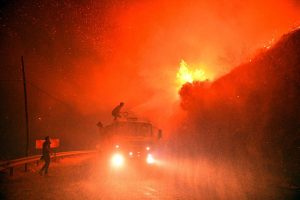
Credit: Xinhua/Alamy Live News
It’s not easy being green, by Kaya Genç: The Turkish government is fighting environmental protests with conspiracy theories.
It’s in our nature to fight, by Beth Pitts: The indigenous people of Ecuador are fighting for their future.
Respect for tradition, by Emily Brown: Australia has a history of “selective listening” when it comes to First Nations voices. But Aboriginal campaigners stand ready to share traditional knowledge.
The write way to fight, by Liz Jensen: Extinction Rebellion’s literary wing show that words remain our primary tool for protests.
Change in the pipeline? By Bridget Byrne: Indigenous American’s water is at risk. People are responding.
The rape of Uganda, by Issa Sikiti da Silva: Uganda’s natural resources continue to be plundered.[/vc_column_text][/vc_column][/vc_row][vc_row][vc_column][vc_custom_heading text=”Comment” font_container=”tag:h2|font_size:22|text_align:left”][/vc_column][/vc_row][vc_row][vc_column][vc_column_text]Cigar smoke and mirrors, by James Bloodworth: Cuba’s propaganda must not blight our perception of it.
Denialism is not protected speech, by Oz Katerji: Should challenging facts be protected speech?
Permissible weapons, by Peter Hitchens: Peter Hitchens responds to Nerma Jelacic on her claims for disinformation in Syria.
No winners in Israel’s Ice Cream War, by Jo-Ann Mort: Is the boycott against Israel achieving anything?
Better out than in? By Mark Glanville: Can the ancient Euripides play The Bacchae explain hooliganism on the terraces?
Russia’s Greatest Export: Hostility to the free press, by Mikhail Khordokovsky: A billionaire exile tells us how Russia leads the way in the tactics employed to silence journalists.
Remembering Peter R de Vries, by Frederike Geeerdink: Read about the Dutch journalist gunned down for doing his job.
A right royal minefield, by John Lloyd: Whenever one of the Royal Family are interviewed, it seems to cause more problems.
A bulletin of frustration, by Ruth Smeeth: Climate change affects us all and we must fight for the voices being silenced by it.[/vc_column_text][/vc_column][/vc_row][vc_row][vc_column][vc_custom_heading text=”Culture” font_container=”tag:h2|font_size:22|text_align:left”][/vc_column][/vc_row][vc_row][vc_column][vc_column_text]
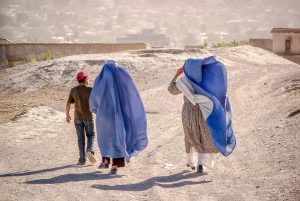
Credit: Gregory Maassen/Alamy
The man who blew up America, by David Grundy: Poet, playwright, activist and critic Amiri Baraka remains a controversial figure seven years after his death.
Suffering in silence, by Benjamin Lynch and Dr Parwana Fayyaz The award-winning poetry that reminds us of the values of free thought and how crucial it is for Afghan women.
Heart and Sole, by Mark Frary and Katja Oskamp: A fascinating extract gives us an insight into the bland lives of some of those who did not welcome the fall of the Berlin Wall.
Secret Agenda, by Martin Bright: Reforms to the UK’s Official Secret Act could create a chilling effect for journalists reporting on information in the public interest.[/vc_column_text][/vc_column][/vc_row][vc_row disable_element=”yes”][vc_column][three_column_post title=”You may also like to read” category_id=”42664″][/vc_column][/vc_row]
29 Sep 21 | Malaysia, News and features, Statements
[vc_row][vc_column][vc_column_text]
- Clare Rewcastle Brown fears she will be arrested when she arrives in Spain later this week
- Charities have written to INTERPOL today seeking clarification over whether a Red Notice has been issued for her arrest
- On 23 September 2021, the Malaysian Government issued a warrant for her arrest regarding a book about the 1MDB scandal.

British journalist Clare Rewcastle Brown Photograph by Felix Clay
This morning ARTICLE 19, Index on Censorship and Fair Trials wrote to Interpol to request clarification about whether a Red Notice or Diffusion has been issued against the British journalist, Clare Rewcastle Brown. The fourteen undersigned organisations would like to reiterate calls for Interpol to clarify the situation in order to ensure Ms Rewcastle Brown’s unrestricted entry to Spain later this week.
Ms Rewcastle Brown is the founder and editor-in-chief of the Sarawak Report and known for exposing high-level corruption involving the former Prime Minister of Malaysia (popularly known as the ‘1MDB scandal’). In 2015, the Sarawak Report published an article on the diversion of USD 700m into the personal accounts of the prime minister of Malaysia, Najib Razak. Subsequently, Ms Rewcastle Brown faced charges of ‘activities detrimental to parliamentary democracy’, which formed the basis of a Red Notice request by the Malaysian authorities. In August 2015, Fair Trials wrote to Interpol expressing concerns that the Red Notice would likely violate Interpol’s rules. At the time, they took the unusual step of confirming that although a Red Notice request had been received, it was refused by the General Secretariat.
As of 23 September 2021, Ms Rewcastle Brown has been subject to a new arrest warrant in Malaysia. According to media reports, she is wanted over criminal defamation charges brought by the wife of the Sultan of Terengganu regarding statements made about her in Ms Rewcastle Brown’s 2018 book about the 1MDB scandal.
If a Red Notice has been issued, Ms Rewcastle Brown could be arrested when she travels to Spain later this week to visit an elderly relative who needs her support. There is also a risk that she could be held in detention and face extradition to Malaysia.
The undersigned organisations have serious concerns that the Malaysia National Central Bureau might be trying to use Interpol’s systems to judicially harass Ms Rewcastle Brown. The organisations are calling on Interpol to clarify whether there has been an attempt to issue a Red Notice or Diffusion by Malaysia, and whether such an attempt has been successful.
Clare Rewcastle Brown said: “These criminal charges are linked to a civil defamation case and my lawyers believe they represent an abuse of due process to put pressure on me as the defendant against a politically powerful litigant. When the original criminal complaint was brought in 2018 the police declined to action it. However, last month the political party behind the multi-billion dollar 1MDB sovereign wealth fund theft, which lost an election after I had exposed the scandal, returned to office.
“I am concerned that the same actors who tried to abuse Interpol by having me arrested as a terrorist in 2015 will, having returned to power, attempt to file another Interpol Red Notice alert with the aim of having me detained anywhere in the world. They are seeking to paint me as a criminal for exposing their corrupt practices which is my job as a journalist and they are using a claim of ‘criminal libel’ which is simply not a crime that exists in the UK or most democratic countries where the freedom of journalists to report on the politically powerful is rightly protected. I could be thrown into jail at a border by officials who have no idea about the background to this case or the spurious nature of these charges and then face months of legal action fighting extradition charges to get back to Britain.”
Bruno Min, legal director at Fair Trials said: “Some countries will go to extraordinary lengths to quash dissent, including by abusing Interpol Red Notices and Diffusions to harass and intimidate critics, wherever they might be. Interpol must send a clear message to the world that it will not tolerate the misuse of its systems as a tool of oppression by ensuring that journalists and writers like Clare Rewcastle Brown are protected from abusive Red Notices and Diffusions.”
Sarah Clarke, Head of Europe and Central Asia at ARTICLE 19 said: “This latest act of legal intimidation by the Malaysian authorities against Clare Rewcastle Brown is part of a pattern of serious judicial harassment against the journalist as a direct reprisal for her work in exposing massive corruption. Interpol must recognise this as a vexatious act of intimidation and ensure they are not complicit in the abuse of their system.”
Jessica Ní Mhainín, policy and campaigns manager at Index on Censorship said: “It’s an indictment of international policing that a journalist travelling from one jurisdiction to another should fear an arrest for her work, which is overwhelmingly in the public interest. Interpol should take immediate steps to block any efforts by the Malaysian authorities to abuse its systems to harass Clare Rewcastle Brown, and ensure her unrestricted entry to Spain.”
Read the letter to INTERPOL here
Contact: Jessica Ní Mhainín, policy and campaigns manager, [email protected]
SIGNED:
ARTICLE 19
Blueprint for Free Speech
The Daphne Caruana Galizia Foundation
English PEN
European Centre for Press and Media Freedom (ECPMF)
Fair Trials
IFEX
Index on Censorship
International Press Institute (IPI)
Justice for Journalists Foundation
OBC Transeuropa (OBCT)
PEN International
Reporters Without Borders (RSF)
South East Europe Media Organisation (SEEMO)[/vc_column_text][/vc_column][/vc_row]
29 Sep 21 | Angola, News and features, Portugal
[vc_row][vc_column][vc_column_text] Index on Censorship is extremely concerned at the lawsuit that has been filed against author and journalist Oliver Bullough (right). Bullough is being sued in Portugal by the vice president of Angola for €525,000 in relation to his award-winning non-fiction book, Moneyland.
Index on Censorship is extremely concerned at the lawsuit that has been filed against author and journalist Oliver Bullough (right). Bullough is being sued in Portugal by the vice president of Angola for €525,000 in relation to his award-winning non-fiction book, Moneyland.
The complaint relates to questions Bullough raised in his book about how Angola’s Vice President Bornito de Sousa Baltazar Diogo could have afforded to spend USD $200,000 on custom-made bridal wear for his daughter. De Sousa claimed that he paid for the dresses on his public servant’s salary, after the shopping spree was featured on the US reality TV show “Say Yes to the Dress”.
“We need investigative journalism to hold power to account. How can journalists be expected do this if they are being subject to aggressive legal claims in plaintiff-friendly jurisdictions?” said Jessica Ní Mhainín, Policy and Campaigns Manager at Index on Censorship. “Bullough is being sued for more than half a million Euro in a jurisdiction he has never before set foot in, for publishing information that is clearly in the public interest.”
Bullough’s Portuguese publisher, 20/20 Editora, is named as the second defendant in the lawsuit. Separately, de Sousa is suing Portuguese anti-corruption activist Paulo de Morais, co-founder of the Portuguese chapter of Transparency International, who recounted the purchases on Portuguese television.
Index on Censorship has filed a Council of Europe media freedom alert.[/vc_column_text][/vc_column][/vc_row]
27 Sep 21 | Egypt, Fellowship 2021, News and features, Statements
[vc_row][vc_column][vc_column_text]
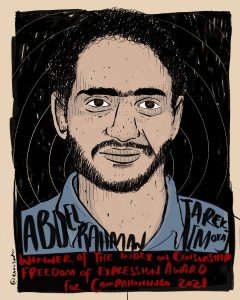
Abdelrahman ‘Moka’ Tarek
Abdelrahman Tarek (widely known as Moka) is a human rights defender working with Al-Nedal Centre for Rights and Freedoms. His work includes defending free expression in Egypt and prisoners’ rights, especially in cases of forced disappearances. On 12 September 2021, Moka was awarded Index on Censorship’s Freedom of Expression Award in recognition of his campaigning work. The award celebrates individuals or groups who have had a significant impact fighting censorship anywhere in the world.
Moka was first arrested on 26 November 2013 in relation to the “Shura Council” case, when a number of activists organized a protest against military trials for civilians in front of the Egyptian Senate (Shura Council) and were subsequently arrested.
On 11 June 2014, he was sentenced to three years in prison and three years of police probation. He was held in Tora El Mazraa Prison; during his detention, he was frequently subjected to torture, as a result of which he still suffers psychologically. After his release in October 2018, he began to serve his three-year probationary period, during which he had to spend 12 hours a day at the Qasr Al Nil Police Station in Cairo. On 10 September 2019, Moka was forcibly disappeared during his daily probation session at Qasr Al Nil Police Station. A day later, he re-appeared at the office of the Supreme State Security Prosecution (SSSP), where he was interrogated in Case No. 1331 of 2019. He was accused of “joining a terrorist group, spreading false news, and misusing social media” by the prosecutor during the interrogation, and was ordered into pre-trial detention.
On 10 March 2020, a court ordered his release on probationary measures, which included reporting to a police station every few days. He was, however, never released. Instead, he was forcibly disappeared for 50 days. On 30 April 2020, the SSSP ordered Moka into pre-trial detention on new charges of “joining a terrorist group, spreading false news, and misusing social media” – the same accusations he faced in the previous case.
On 22 September 2020, a court ordered the release of Moka. However, once again, the release order was never implemented. On 3 December 2020, after being held arbitrarily for over 70 days, the SSSP interrogated Moka for “establishment and funding of a terrorist organisation.” On 3 December 2020, he was ordered into pretrial detention in that case. He started a hunger strike to protest the Prosecutor’s decision.
In mid-January 2021, Moka was transferred to Tora Prison, which is known for its inhumane detention conditions, such as lack of clean water, poor ventilation, and overcrowding. On 17 January 2021, he was hospitalised at Tora Prison Hospital for the first time, due to his deteriorating health. He had to be hospitalised several times afterward. On 3 February 2021, he ended his hunger strike.
Since Moka was detained in September 2019, two consecutive orders for his release have been preempted by the addition of new cases, allowing authorities to evade the two-year legal limit on pre-trial detention in Egypt.
In the first week of August 2021, Moka attempted suicide after he was denied a family visit. As punishment, Moka was placed in a disciplinary cell for 24 hours.
Accepting the award on behalf of Moka, one of his family members said: “I am sure that when Moka hears that he won this award he will be extremely happy and he will spend a happy night but when he wakes up the next day, he will be feeling disappointed and frustrated that he will be spending another day in prison.”
Moka is among the thousands of people arbitrarily detained in Egypt, including human rights defenders, journalists, politicians, lawyers, and social media influencers. They remain in prolonged detention solely for exercising and defending fundamental human rights.
“Today I tried to be Moka’s voice, and I want each of you to be his voice, until he comes out of prison alive,” his family member said. “Freedom for Moka and all detainees.”
We, the undersigned organisations, call on the Egyptian government to immediately and unconditionally release Abdulrahaman Tarek.
Signatories:
ARTICLE 19
Democracy for the Arab World Now (DAWN)
FIDH, within the framework of the Observatory for the Protection of Human Rights Defenders
Freedom House
Index on Censorship
International Service for Human Rights (ISHR)
MENA Rights Group
The Egyptian Commission for Rights and Freedoms
The Tahrir Institute for Middle East Policy (TIMEP)
World Organisation Against Torture (OMCT), within the framework of the Observatory for the Protection of Human Rights Defenders[/vc_column_text][/vc_column][/vc_row]
27 Sep 21 | China
[vc_row][vc_column][vc_column_text]“First, we stood up, then we got rich, and now we got strong.” Chinese officials are repeating this slogan over and over, China analyst Mareike Ohlberg recently told the audience at an Index on Censorship event. “Part of being a strong country means being able to influence or determine what people talk about, not just in China but globally.”
Confucius Institutes were established in 2004 with the stated mission of teaching Chinese language and culture abroad and are widely acknowledged as one of the ways China exerts its influence around the world. In 2010, the Confucius Institute headquarters (known as Hanban) received the ‘Chinese Influence the World Award’. “People often ask me about the Confucius Institute’s role in soft power,” said its founder, Xu Lin, at the award ceremony. “We are indeed trying to expand our influence.”
Confucius was a sixth-century philosopher, educator, and quasi-religious figure, who has since come to symbolise peace and harmony. By promoting this image and avoiding any reference to Marxist ideology, a Chinese state institution has made its way onto more 550 university and college campuses, and into 1,172 primary and secondary school classrooms around the world. According to the New York Times, “The carefully selected label [of Confucius Institutes] speaks volumes about the country’s soft-power ambitions.”
In the West, the largest number of Confucius Institutes are found in English-speaking countries. Why? “The Chinese government is minimalist,” Ohlberg replied. “If you have the government in your pocket, why do you need a Confucius Institute?” The UK has approximately 30 Confucius Institutes, five in Scotland. France has 21, Germany has 19, and Italy has 16. There are 103 in the EU.
By operating primarily on campuses, Confucius Institutes are unlike other countries’ cultural organisations, like the British Council, Alliance Française, or Goethe Institutes. Tao Zhang of Nottingham Trent University believes this enables the Chinese authorities “to gain a foot-hold for the exercise of control over the study of China and the Chinese language.”
Confucius Institutes are also unlike European institutes in that they are directly managed by the Chinese government. According to the Netherlands Institute of International Relations, “[t]his offers Confucius Institutes the possibility to unilaterally promote Chinese policy and ideas in a one-sided way, to commit censorship, or to stimulate self-censorship about China among students, pupils and the wider public”.
This new report looks the rise of the Institutes and whether those fighting for freedom of expression should be worried.[/vc_column_text][vc_column_text]
[dflip id="117559" ][/dflip]
[/vc_column_text][/vc_column][/vc_row]
24 Sep 21 | Bosnia, China, News and features, Turkey, Volume 50.03 Autumn 2021 Extras
[vc_row][vc_column][vc_single_image image=”117556″ img_size=”full” add_caption=”yes”][vc_column_text]Almost three decades ago, some three million books and countless artefacts went up in flames when Sarajevo’s National and University Library – inside the Vijecnica (city hall) – was burned to the ground. The destruction of the Vijecnica at the beginning of the war was a symbol for one of the aggressor’s main objectives – silencing the soul of the city and crushing the cultural identity of an entire society.”
So said Dunja Mijatović, the current Council of Europe commissioner for human rights, who was born in Sarajevo when it was part of Yugoslavia.
Just weeks before the anniversary of the burning of the library on 25 August 1992, Mijatović spoke to Index about its symbolism and what its destruction was meant to achieve.
She quoted Heinrich Heine’s play, Almansor: “Where they burn books they will also, in the end, burn people.”
Libraries and archives have been targets for centuries, and the reason is always the same: it’s about taking away knowledge and stifling free thinking.
Libraries are, and have always been, symbols of freedom – the freedom to think and learn and find documents and books to debate and discuss.
Throughout history, when authoritarians take power and seek to control thought and behaviour, they either lock up libraries or destroy the manuscripts and books inside them.
The Serbian forces who burned the Sarajevo library were seeking to obliterate evidence of Bosnia and Herzegovina’s existence as a successful multicultural and multi-ethnic state. The documents they burned told a different history from the one that the army leaders wanted to portray.
Omar Mohammed, who reported as Mosul Eye on the Isis occupation of his city in Iraq, risked his life to blog anonymously about the occupiers’ wish to destroy books as well as to execute people as they sought to repress the population.
Mohammed told Index that it was not just the university library that was destroyed in Mosul, but it was the one that was reported on the most.
Many other libraries, even private collections, were wiped out. “The only possible reason is because knowledge is power,” he said. “Once you prevent people from accessing knowledge then you will have full control over them.”
Like many other scholars who have delved into the history of libraries, Mohammed understands that it is not about the buildings themselves.
“They don’t want people to have this access because they know if people write the history, it will be completely different from the one they wanted it to be,” he said.
Targeting libraries sends out a powerful message to scholars, historians and scientists, he added.
“When they see that such people are able to totally target the libraries, that they are literally able to destroy everything, it’s a manifestation of brutality.”
Today, Richard Ovenden, the most senior librarian at the Bodleian libraries at the University of Oxford, is worried about libraries in Turkey being closed under pressure from the government of president Recep Tayyip Erdoğan.
According to some sources, at least 188 libraries were closed there between 2002 and 2020.
Ovenden’s book, Burning the Books, looks at the history of the intentional destruction of knowledge. He was recently contacted by a Turkish student, who said: “I’ve just read your book and I want you to know how bad it is in Turkey, because libraries are being destroyed. And all the things that you write about are true in Turkey today.”
Ovenden said: “There is an absolutely authoritarian control over knowledge. Attacks on knowledge are being exercised by the authoritarian leader of Turkey right now. It is the ability for the population to generate their own ideas and to come up with their own thoughts that some governments, some authoritarian powers, some dictators and rulers do not like.”
When dictatorships seek to establish that certain minorities don’t exist, or haven’t lived somewhere, getting rid of the documentary evidence is very convenient.
Archives that establish the existence of Uighurs in China and Muslims in parts of India also look like targets.
Ovenden feels that what is fantastically important about libraries is that they “preserve the past thoughts and ideas of human beings so they’re parts of that evidence base”.
He added: “They’re also disseminating institutions [where] you can borrow the books, you can come and take those ideas away and write other books about them, or pamphlets, or newspaper articles, or whatever it is.”
Governments around the world are failing to protect libraries as a resource, sometimes by withdrawing or drastically reducing funding.
In the UK, almost 800 libraries closed between 2010 and 2019, and a major campaign kicked off in Australia this year to save the national archives.
Michelle Arrow, professor of history at Macquarie University in Sydney, argued in April that if funding cuts were not reversed, irreplaceable audio-visual collections would fall apart. After a public campaign, the national government has delivered some extra funding, but this has not solved all the archives’ problems.
She told Index that with a reduction in staff of almost 25% since 2013, more staff would be needed to deal with the large backlog of requests to view archived material.
She said the archives contained “unique records, and they touch almost every Australian: it is a democratic archive, a collection of ordinary people’s records, rather than famous or renowned Australians”.
While some countries are seeing numerous library closures due to financial or other threats, there are new defenders coming to light. In the coastal city of Santa Cruz in California, there’s a massive investment in upgrades to current libraries, and new ones are opening over the next two years.
Santa Cruz mayor Donna Meyers told Index: “In California, we just tend to believe in public institutions. We believe that public education, public libraries, all of that, lead to a better community, lead to a more informed society.”
Santa Cruz residents passed a special tax – by 78% of the vote – to pay for investment in the libraries which, Meyers says, is a sign of how committed the community is to libraries being around for future generations.
Back in Sarajevo, Mijatović can see the new library that rose from the ashes of the Vijecnica from her terrace.
She said: “One hopes that the soul and the people of Sarajevo will recover and that new generations will hopefully enjoy this magnificent symbol of Sarajevo and, more importantly, live in peace.”
Library destruction in recent history
1914: German troops destroy the library of the Catholic University of Louvain
1939: The Great Talmudic Library in Lublin is destroyed by the Nazis
1966-76: Chairman Mao destroys libraries across China as part of the Cultural Revolution
1976-79: The Khmer Rouge deliberately destroy libraries across Cambodia, including the Phnom Penh national library
2013: Islamic troops set fire to the library in Timbuktu, Mali
[/vc_column_text][/vc_column][/vc_row]




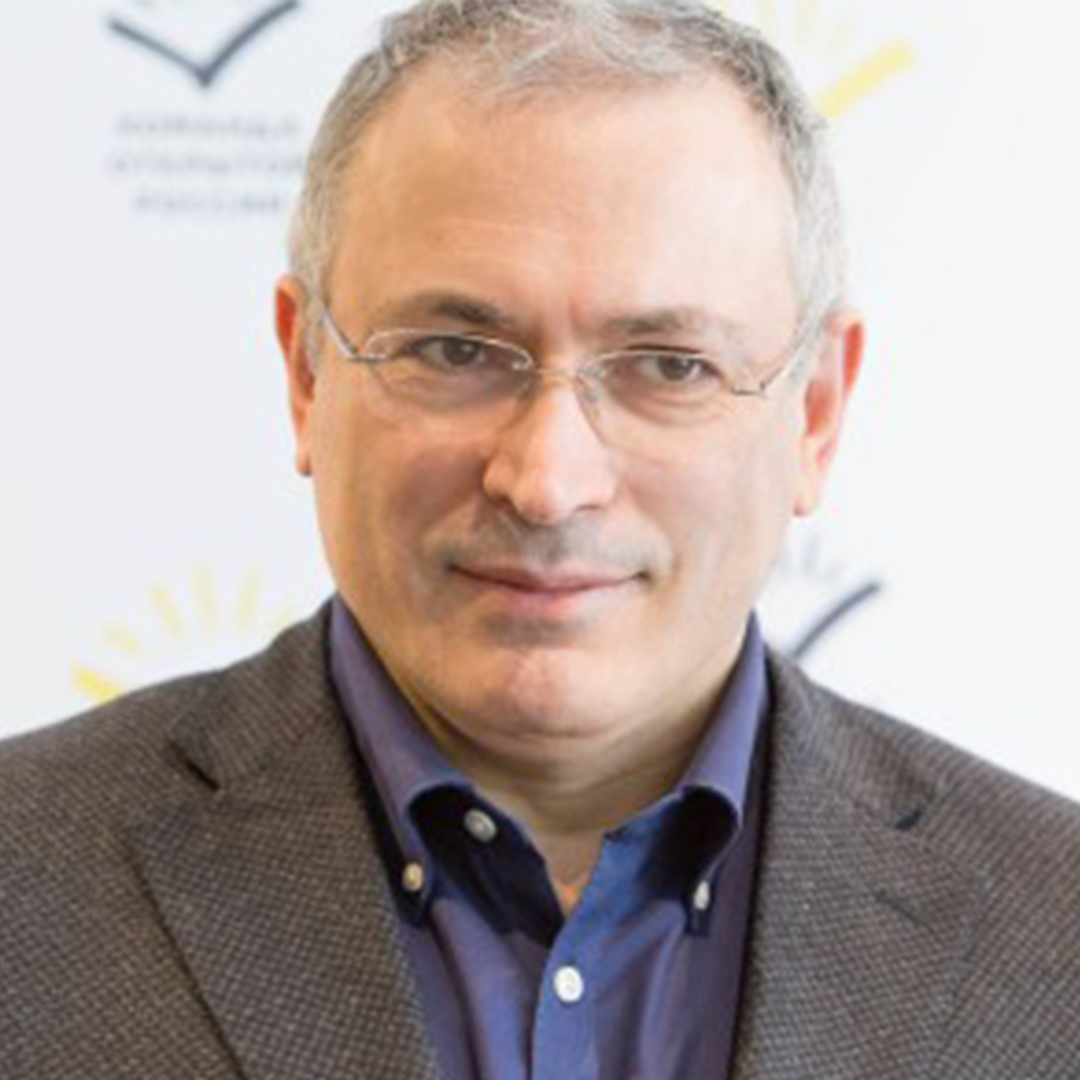
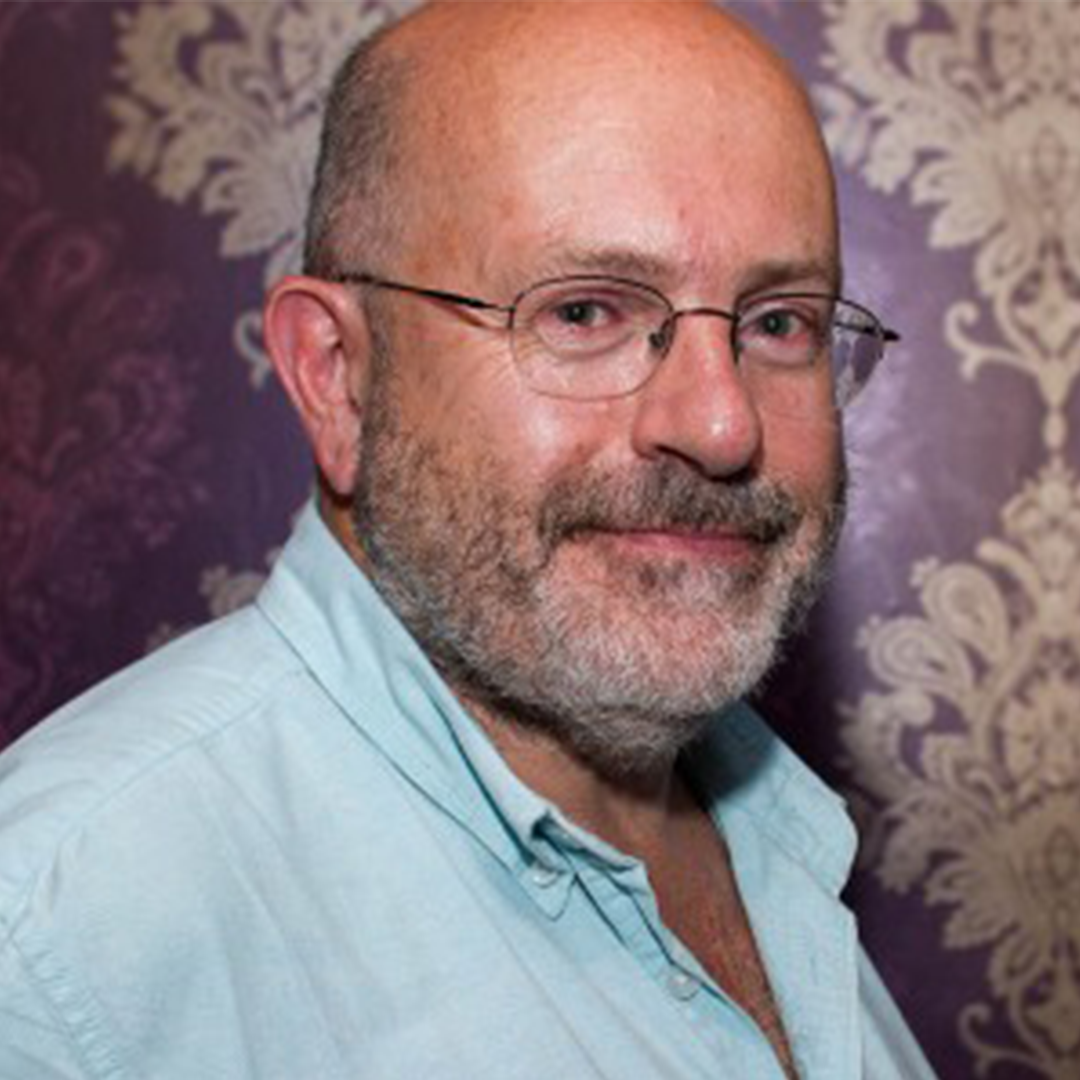
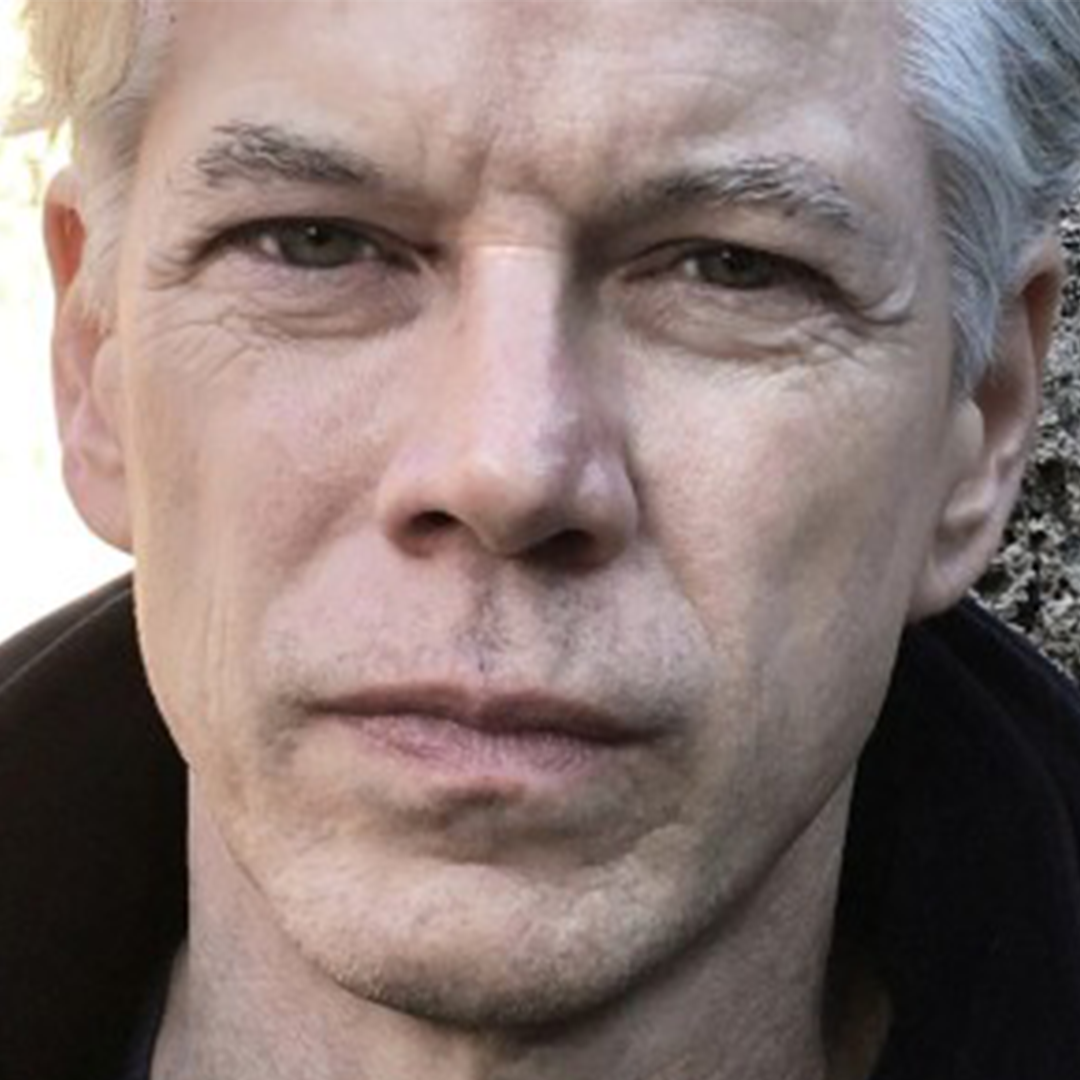





 Index on Censorship is extremely concerned at the lawsuit that has been filed against author and journalist Oliver Bullough (right). Bullough is being sued in Portugal by the vice president of Angola for €525,000 in relation to his award-winning non-fiction book, Moneyland.
Index on Censorship is extremely concerned at the lawsuit that has been filed against author and journalist Oliver Bullough (right). Bullough is being sued in Portugal by the vice president of Angola for €525,000 in relation to his award-winning non-fiction book, Moneyland.